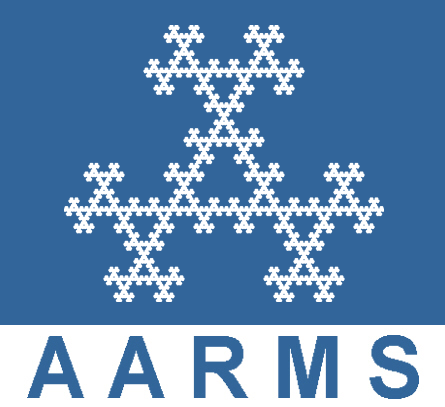Réunion d'hiver SMC 2015
Université McGill, 4 - 7 décembre 2015
Org: Scott Parsell (West Chester University of Pennsylvania) et Craig Spencer (Kansas State)
[PDF]
- BRIAN COOK, University of Wisconsin - Madison
Diophantine equations in the primes [PDF]
-
We are concerned with the set of solutions, say $V$, to a given Diophantine equation of the form $Q(x)=0$, $x=(x_1,...,x_n)$, which have each coordinate $x_i$ a prime number. If $Q$ is large in terms of a certain notion of rank and satisfies certain local conditions, then $V$ behaves as expected according to standard heuristics. Our aim in this talk is to overview some further results (and questions) for the set $V$. In particular, we shall discuss convergence results for certain ergodic averages on $V$.
- BRANDON HANSON, Penn State
Character Sums with Convolutions [PDF]
-
We discuss applications of sum-product theory and additive combinatorics to the estimation of multiplicative character sums over a finite field.
- JING-JING HUANG, University of Nevada, Reno
Rational points near hypersurfaces [PDF]
-
The distribution of rational points on algebraic varieties is a central problem in number theory. An even more general problem is to investigate rational points lying very close to manifolds, where the algebraic condition is replaced with the non-vanishing curvature condition. In this talk, we will establish a sharp upper bound for the number of rational points of a given height and within a given distance to a hypersurface. This has surprising applications to counting rational points lying on the manifold; indeed setting the distance to zero, we are able to prove an analogue of Serre's Dimension Growth Conjecture (originally stated for projective varieties) in this general setup. Our main innovation in the proof is a bootstrap method that relies on the synthesis of Poisson summation, projective duality and the method of stationary phase.
- ALEX IOSEVICH, University of Rochester
Exponential bases and frames: the return of the Fuglede Conjecture [PDF]
-
We shall explore exponential bases and frames both in Euclidean space and vector spaces over finite fields. In the process we shall prove a recent result due to Iosevich, Mayeli and Pakianathan establishing the Fuglede Conjecture in ${\Bbb Z}_p^2$, namely that the a subset of ${\Bbb Z}_p^2$ has an orthogonal basis of characters if and only if it tiles ${\Bbb Z}_p^2$ by translation. Different types of interaction between analytic, combinatorial and algebraic methods shall be emphasized throughout.
- MIKE KNAPP, Loyola University Maryland
Sextic forms over extensions of $\mathbb{Q}_2$ [PDF]
-
In this talk, we determine the minimum number of variables needed to guarantee that a homogeneous polynomial of the form $a_1 x_1^6 + a_2x_2^6 + \cdots + a_s x_s^6$ has a nontrivial zero in certain quadratic extensions of $\mathbb{Q}_2$.
- ANGEL KUMCHEV, Towson University
Recent progress in the Waring-Goldbach problem [PDF]
-
Recent progress on Vinogradov's mean-value theorem has resulted in improved estimates for exponential sums of Weyl type. In recent joint work with T.D. Wooley, we apply these new estimates to obtain sharper bounds for the function $H(k)$ in the Waring-Goldbach problem. We obtain new
results for all exponents $k \ge 8$; in particular, we establish that $H(k) \le (4k-2)\log k+k-7$
when $k$ is large. The latter bound represents the first improvement on a classical result of Hua from the 1940s.
- WENTANG KUO, University of Waterloo
Multi-dimensional Waring's problem in function fields [PDF]
-
The classical Waring's problem is to consider the representations of
positive integers as sum of \(k\)th powers. S. T. Parsell considers the multi-dimensional generalization of Waring's
problem. For a positive integer \(d \geq 2\), let
\( \mathcal{M}=\big\{(i_1,\ldots,i_d)\in \mathbb{N}^d\,\big |\, i_1+\cdots+i_d
=k\; \big\}\).
For positive integers $P$ and $n_{\bf i}$ $({\bf i}\in\mathcal{M})$,
denote by $R_{s,k,d}({\bf n},P)$ the number of solutions of the system of equations
\[x_{11}^{i_1}\cdots x_{1d}^{i_d}
+\cdots+x_{s1}^{i_1}\cdots x_{sd}^{i_d}=n_{\bf i} \quad({\bf i}\in\mathcal{M})\]
with $x_{ij}\in \{1,2,\ldots,P\}$.
S. T. Parsell first proves that when $d=2$ and
\(s\geq (14/3)k^2\log k+(10/3)k^2\log\log k+O(k^2)\),
under certain solubility hypothesis, one has
\(R_{s,k,d}({\bf n},P)\gg P^{2s-k(k+1)}\).
In this talk, we will discuss the function field analogue of the multi-dimensional generalization of Waring's problem and apply the recent improvement of Vinogradov-type estimates to get the best known result in the function field setting. It is a joint work with Yu-Ru Liu and Xiaomei Zhao.
- NEIL LYALL, University of Georgia
On some problems in Geometric Ramsey Theory [PDF]
-
We plan to discuss progress in some ongoing projects in geometric Ramsey theory.
- AKOS MAGYAR, University of Georgia
On the distribution of integer and prime solutions to diophantine equations [PDF]
-
Let Q be a positive homogeneous integral polynomial. We study the equi-distribution of the solutions to the diophantine equation Q(x)=l, both with integer and prime variables.
We prove some quantitative results in terms of the discrepancy with respect to caps, defined as intersections of the level surface {Q=l} with half-spaces, assuming that the form Q has sufficiently high rank. In the simplest settings one obtains the equidistribution of lattice points on spherical caps in dimensions at least 4.
- MISTY OSTERGAARD, Kansas State University
Solutions of Diagonal Congruences with Variables Restricted to Small Intervals [PDF]
-
Our interest is in finding solutions to the diagonal congruence
\begin{equation}\label{cong}
\sum_{i=1}^n a_ix_i^k \equiv c \pmod q
\end{equation}
in a cube $\mathcal{B}$ of side length $b$. As an example, for a sufficiently large prime modulus and $n \geq 2k^3$, we obtain a solution to \eqref{cong} in any cube $\mathcal{B}$ of side length $b \geq p^{\frac{1}{k} + \frac{2(k-2)}{n} + \varepsilon}$. Similar results are found for fewer variables. Refinements are obtained for the case of small solutions, and for the case where the number of variables is very large. Results are also given for a general modulus $q$.
- ANDY POLLINGTON, National Science Foundation
Diophantine approximation, a conjecture of Wolfgang Schmidt, Schmidt games and irregularities of distribution [PDF]
-
We describe Littlewood's conjecture in Diophantine approximation and some related questions and also present some connections to work on irregularities of distribution. Some of the work I will describe is Joint with Dmitry Bhadzian, Sanju Velani and some with William Moran.
- PAUL POTGIETER, University of South Africa
Salem sets, equidistribution and arithmetic progressions [PDF]
-
The decay of the Fourier-Stieltjes transform of a measure on a set of positive Fourier dimension is an indication of the uniformity of distribution of the support of the measure. Such uniformity could also indicate that the set has additive properies, such as containing arithmetic progressions, if certain density conditions are satisfied. The same phenomenon can be observed in initial segments of the integers whose discrete Fourier transform decays sufficiently quickly. By adapting a construction of Salem, we make this correspondence precise by showing that infinite subsets of the integers can be used to construct Salem sets in the continuum. Through a characterisation of Salem sets in terms of equidistribution, we further show that one can construct subsets of the integers with a given uniformity requirement from Salem sets, in such a way that arithmetic progressions are preserved.
- ALEX RICE, University of Rochester
Difference Sets and Polynomials [PDF]
-
In a series of papers in the 1970s, Sárközy proved that any set of integers
of positive upper density necessarily contains two distinct elements which differ by a
perfect square, as well as two elements which differ by one less than a prime number,
confirming conjectures of Lovász and Erdös, respectively. In this talk, we provide
a brief survey of the extensive literature that has developed on improvements and
extensions of these results, culminating in a brand new "super theorem" which
expands to sums of polynomials, improves certain quantitative bounds, and includes
most previous results as special cases. This is joint work with Neil Lyall.
- ROBERT VAUGHAN, Penn State University
Zeros of Dirichlet series [PDF]
-
We are concerned here with Dirichlet series
\begin{equation*}
f(s) = 1 +\sum_{n=2}^{\infty} \frac{c(n)}{n^s}
\end{equation*}
which satisfy a function equation similar to that of the Riemann zeta function, typically of the form
\begin{equation*}
f(s) = 2^s q^{1/2-s} \pi^{s-1} \Gamma(1-s) \big(\sin\textstyle\frac{\pi}{2}(s+\kappa)\big) f(1-s),
\end{equation*}
but for which the Riemann hypothesis is false. Indeed we show that the zeros of such functions are ubiquitous in the complex plane.
- TREVOR WOOLEY, University of Bristol
Efficient congruencing, Fourier restriction theory, and Waring's problem [PDF]
-
We report on recent progress concerning Vinogradov's mean value theorem, and related systems of equations of only approximately translation-dilation invariant nature. Based on the application of ``efficient congruencing'', these ideas may also be applied to establish mean value estimates of the shape
$$\int_{[0,1)^t} \Biggl| \sum_{1\le n\le N} a_ne(\alpha_1n^{k_1}+\ldots +\alpha_tn^{k_t})\Biggr|^{2s}
\, {\rm d}\alpha_1\ldots \, {\rm d}\alpha_t\ll N^\epsilon \Biggl( \sum_{1\le n\le N}|a_n|^2\Biggr)^s\quad (a_n\in \Bbb C),$$
of significance in Fourier restriction theory. We will also announce progress on the problem of establishing the asymptotic formula in Waring's problem for fourth and higher powers.
- SHUNTARO YAMAGISHI, Queen's University
Zeroes of polynomials in many variables with prime inputs [PDF]
-
(This is a joint work with S.Y.Xiao)
Given a non-zero form $f(\mathbf{x})\in \mathbb{Q}[x_1, ..., x_n]$, the $h$-invariant of $f$ is defined to be the smallest positive number $h = h(f)$ such that there exists a representation $ f = u_1 v_1 + ... + u_h v_h, $ where $u_i, v_i$ are rational forms of positive degree $(1 \leq i \leq h)$. Let $b(\mathbf{x}) \in \mathbb{Z}[x_1, ..., x_n]$ be a degree $d$ polynomial, and $f_b(\mathbf{x})$ be the degree $d$ portion of $b(\mathbf{x})$. We build on the work of Cook and Magyar to prove that the equation $b(\mathbf{x}) = 0$ is soluble in primes provided that $b(\mathbf{x})$ satisfies suitable local conditions and $f_b$ has a representation $f_b = u_1 v_1 + ... + u_h v_h$, where $h = h(f_b)$, $u_i, v_i$ are rational forms of positive degree $(1 \leq i \leq h)$, and sufficiently large number of $u_i$ are linear.





